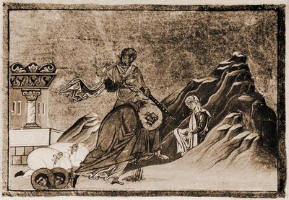
The Works Of Dionysius The Areopagite Volumes 1 & 2
FALLACY OF NAMES
Pearson, Daillé, Blundellum, Erasmus, Valla, Westcott, Lupton, pronounce against the genuineness. Who are you? But Pearson demolishes Daillé; Vossius pulverises Blundellum; Erasmus repudiates Valla. Dr. Westcott, following Dupin, assumes the non-genuineness, but his literary instinct places his Article on Dionysius before that on Origen. Dean Colet bumps the scale against Mr. Lupton.
Pearson, in the xth Chapter of Ignatii Vindiciæ, gives the shortest and best summary in favour of the genuineness. Speaking of the scholars of his own day, he says, “No one is so ignorant as not to know that these writings were recognised as genuine by the best judges in the sixth, fifth, fourth, and third centuries.” Unhappily, he also said, Every “erudite” person regarded them in his day as written in the fourth century, and he assumed the date of Eusebius’ death, as the date of the works, to account for his silence. Hence every inerudite person, who wished to pass for erudite, maintained that opinion for his own reputation. But when Pearson had resurveyed the evidence, he confessed, with shame, that though he had given, what seemed to him a true opinion, he left the decision of the whole matter to the judgment of a more learned person.
Erasmus, in his “Institutio” of a Christian Prince, writes thus:—“Divus ille Dionysius qui fecit tres Hierarchias.” In his prime work, “ratio veræ religionis,” Erasmus not only enumerates the “Divine Names,” the “Mystic and Symbolic Theology,” but calls them, not Stoic, not Platonic, not Aristotelian, but “celestial” philosophy. He so moulds Dionysius into his book, that it becomes Dionysius writing elegant Latin. The only reason which outweighed with him all external testimony, was, that Erasmus could not imagine that any man, living in apostolic times, and so far removed from the age of Erasmus, could possibly have penned such a mirror of apostolic doctrine. How could the Areopagite, though disciple of Paul, and familiar friend of John Theologus, possibly be so learned as the author of these writings? Such is the testimony of the two Theologians who have been permitted to be doubtful of the genuineness.
Copyright ©1999-2023 Wildfire Fellowship, Inc all rights reserved

 Keep Site Running
Keep Site Running